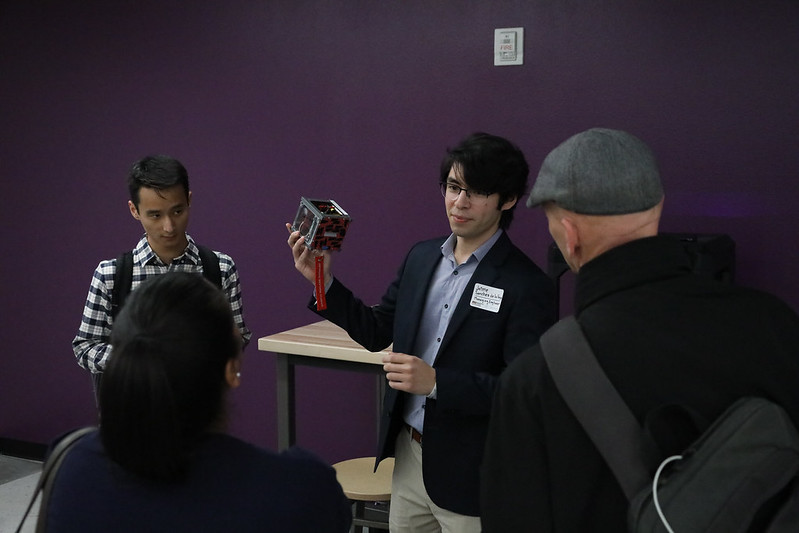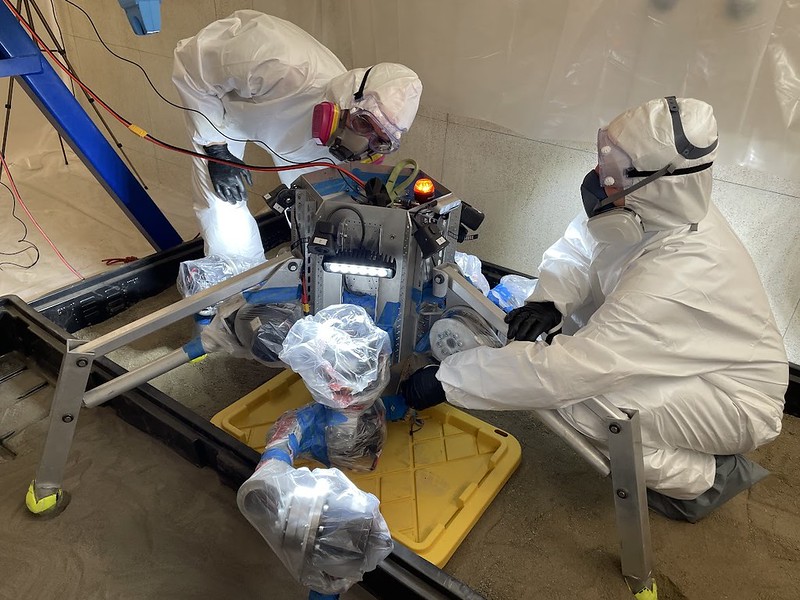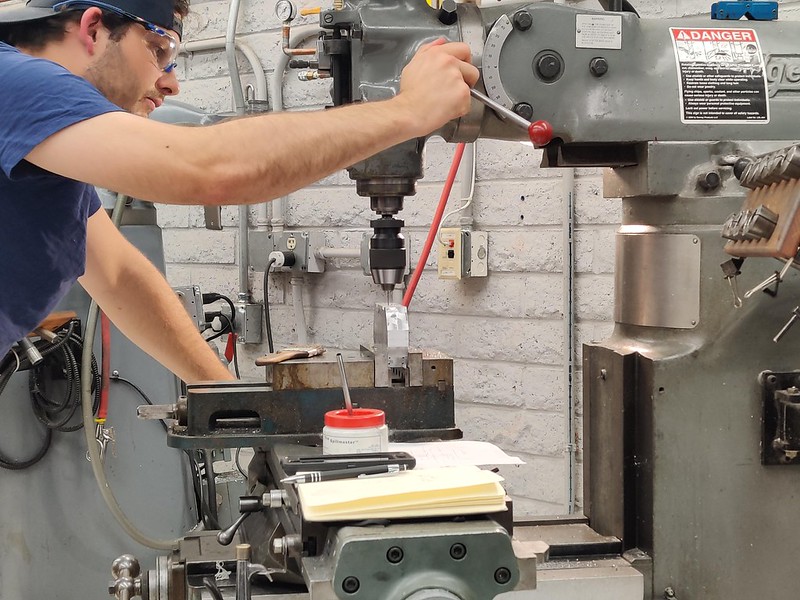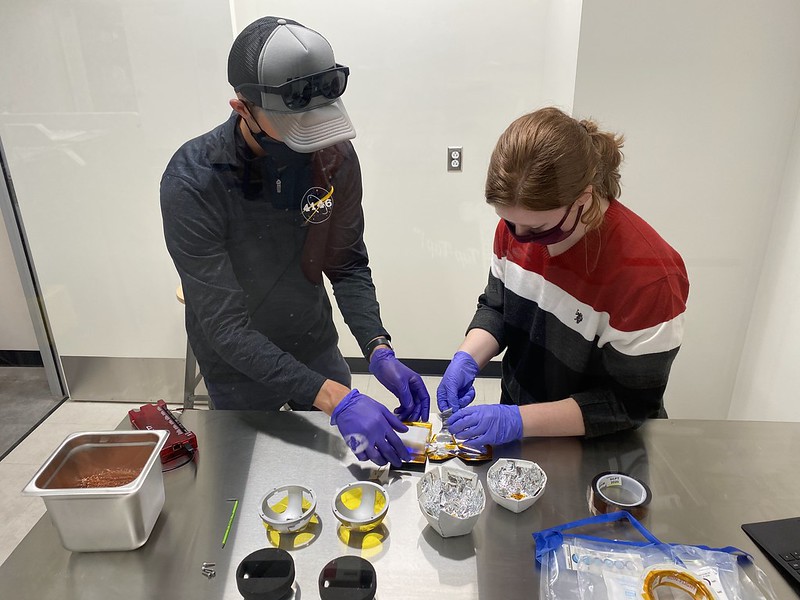by Shireen Dooling and featured Interplanetary Lab students
The ASU Interplanetary Initiative Lab is a “space makerspace” that any ASU student or club can leverage to build and test space hardware and software. Student Lab users can explore their research passions, hone their technical skills, and connect with a spacefaring community ready to propel them further upon graduation!
The Interplanetary Lab is also staffed by a group of stellar students who are responsible for managing the Lab and ensuring all users are safely using lab tools and equipment. They also contribute to building real projects for space in collaboration with industry and faculty.
Below we invite you to meet some of the newest student staff members for the Lab!
Interplanetary Lab student staff features:
Contributor: Ysabella McAuliffe, freshman, Aerospace Engineering (Astronautics)

What is the most exciting thing about working in the Interplanetary Lab?
What’s most exciting about working in the Interplanetary Lab is getting to work on projects that make an impact on the space exploration research at ASU. Coming to work doesn’t feel like a job, and I get to work with others who are just as passionate about learning as I am. I’m excited that I get to have this amazing opportunity as a freshman, and the experience I’ll gain from working here is priceless.
What are you hoping to contribute and learn during your time with the Interplanetary Lab?
I am hoping to contribute to the many ongoing and new projects that will be happening, and I’m really looking forward to working on SPARCS. There are so many different things that I can work on so I am going to do my best to learn from any opportunity that I get. Working on satellites is something new to me, so everything is a learning experience.
What sparked your interest and passion for space?
When I was younger, I wanted to be an astronaut (like every other kid), but this passion for space stuck with me as I got older. I loved going to space centers and science museums, and discovered astronomy. I always tried to be a part of clubs or projects that had to do with space.
What are your future career goals? What kind of impact do you want to have in the space industry?
My future career goal is to be able to enjoy what I do for a living, and to me that means working in the space industry. I feel as if humanity is closer to the stars than ever before, and I want to be a part of that advancement. I also believe that the representation of women is extremely important in engineering, and it’s important for younger girls to know that there is a place for them in STEM careers.
When you’re not working in the Interplanetary Lab or doing coursework, how do you like to spend your time?
In my free time, I enjoy going to the gym. Working out and being active is a big part of my life, and it helps me stay focused and productive in my studies. Aside from that, I love to read, paint, and go hiking.
—
Contributor: Ishi Shah, sophomore, Aerospace Engineering (Astronautics)
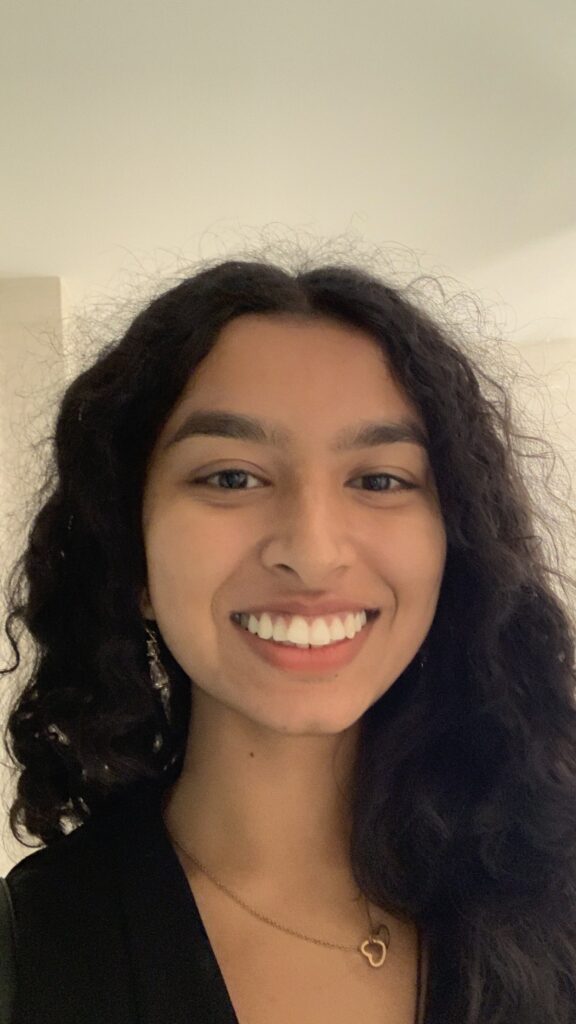
What is the most exciting thing about working in the Interplanetary Lab?
I’m most excited for the opportunity to engage in hands-on satellite projects. Being part of a team that is actively involved in real-world space exploration projects allows me to apply theoretical knowledge gained in my coursework to practical situations. Additionally, the chance to assist fellow students with their engineering projects is genuinely rewarding, as it fosters a collaborative environment where knowledge and skills are shared, contributing to the overall success of the Lab’s endeavors.
What are you hoping to contribute and learn during your time with the Interplanetary Lab?
My primary goal is to contribute meaningfully to our ongoing satellite missions, such as SPARCS. I also aspire to propose innovative ideas for future missions. Simultaneously, I am eager to deepen my understanding of space exploration technologies, project management, and teamwork dynamics. Working in the Lab is also a learning experience that will not only enhance my technical skills but also provide valuable insights into the broader aspects of space research.
What sparked your interest and passion for space?
When I was younger my dad and I would spend some weekend nights stargazing which started my interest in astrophysics. Later on in middle school and high school I pursued other engineering courses which made me realize I wanted to explore my passion for space through engineering.
What are your future career goals? What kind of impact do you want to have in the space industry?
My career goal is to secure a position in the space industry, ideally working on cutting-edge projects that contribute to advancements in space exploration. Whether it’s designing next-generation satellites or developing innovative propulsion systems, I aspire to play a role in pushing the boundaries of exploration. Ultimately, I dream of having the opportunity to go to space myself. I also hope to make space accessible to everyone; like Ysabella put it, it’s important for young girls to know there’s a place for them in STEM.
When you’re not working in the Interplanetary Lab or doing coursework, how do you like to spend your time?
I enjoy hanging out with friends and staying active whether it be hiking when the weather is nice or swimming and scuba diving. I also like working on small art projects when I have the time.
—
Contributor: Dens Sumesh, Senior, Computer Science
What is the most exciting thing about working in the Interplanetary Lab?
The most exciting thing about the Interplanetary Lab is the projects that we get to work on, ranging from designing and building satellites from scratch to setting up complex data analysis tools to understand the data we receive from satellites in orbit. Even as a computer science major, I love the ability to apply what I’ve learned to real world hardware and software and have to account for situations that I would never have thought about. Also, being able to act as a mentor for the other volunteers that come in and out of the Lab working on various projects is extremely rewarding.
What are you hoping to contribute and learn during your time with the Interplanetary Lab?
In my time at the Interplanetary Lab, I hope that I am able to contribute to the new satellite missions that we plan to send up, as well as apply my expertise in other areas for lab management. Furthermore, I hope to learn from the diverse team at the Interplanetary Lab, leveraging their expertise and insights to broaden my own knowledge. Collaborating on cutting-edge space exploration projects, I aim to deepen my understanding of advanced technologies, space science, and interdisciplinary approaches. Ultimately, my goal is to play a key role in pushing the boundaries of our understanding of the universe and contributing to the success of the Lab’s mission in advancing interplanetary exploration.
What sparked your interest and passion for space?
My interest in space was sparked when I got my first telescope at the age of 12. I received it as part of a raffle for my school and being able to look up into the stars piqued my curiosity in what was out there. I want to be part of the force that drives forward our exploration in the parts of space that we have not discovered and make space more accessible.
What are your future career goals? What kind of impact do you want to have in the space industry?
I hope that in the future, I am able to work with engineers on similar projects to what I work on at the Lab. I want to be able to design flight software for these satellites and work with all of the hardware. I hope that I am able to push forward the space industry towards a place where it is more accessible to everyone, so that anyone that looks up at the stars can visit them one day.
When you’re not working in the Interplanetary Lab or doing coursework, how do you like to spend your time?
I spend a lot of my free time playing soccer or spending time with my friends. Currently I play on an intramural soccer team and I also used to play soccer in high school. I also enjoy being active, going to the gym, going on hikes, etc.
—
Interested in learning about what’s happening in the Interplanetary Lab? Sign up for our newsletter to keep up to date on all our space news and student opportunities!
